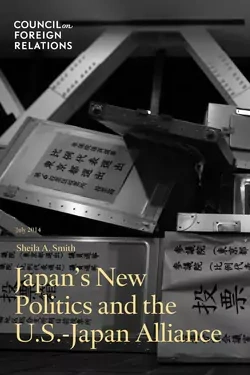
Japan's New Politics and the U.S.-Japan Alliance

- Report
Overview
Japan's new politics challenge some basic assumptions about U.S.-Japan alliance management. From the election of the Democratic Party of Japan (DPJ) in 2009 to the return of the Liberal Democratic Party (LDP) in 2012, this new era of alternating parties in power has revealed the growing importance of Japan's domestic politics in shaping alliance cooperation. The fluidity in electoral outcomes in recent parliamentary elections reveals the extent of Japanese voter frustration with the government. A divided Diet challenged the Japanese government's ability to implement policy. Policy reform is in high demand in Tokyo, and the U.S.-Japan alliance is not immune to the popular call for greater accountability as past choices are increasingly subjected to policy review.
To be sure, the confusion and disconnect between Washington and Tokyo during the early months of the DPJ rule created concerns about the alliance as Prime Minister Yukio Hatoyama sought to revise and revamp alliance priorities, including the difficult relocation effort for the U.S. Marine air base in Okinawa. The March 11 Great East Japan Earthquake, however, revealed the importance of regular alliance planning during times of crisis, and the Naoto Kan cabinet and Barack Obama administration effectively developed a crisis management response for disaster relief in Tohoku and for managing the meltdown of the Fukushima Daiichi reactors. The third DPJ prime minister, Yoshihiko Noda, developed close cooperation with Washington, and advocated for a revision in the bilateral defense cooperation guidelines and closer coordination on the growing challenges in the East China Sea.
More on:
These increased tensions between Japan and China, as well as between Japan and South Korea, set the stage for Japan's second transition in government in 2012. In large numbers, voters shifted their loyalties once again to bring back into power the conservatives under the leadership of Shinzo Abe. Since then, the Abe cabinet has introduced a full defense reform agenda designed to improve Japan's ability to respond to regional trends and strengthen alliance policy coordination, yet regional tensions have also raised challenges for the alliance. Bridging the diplomatic distance between Tokyo and Seoul has been a particularly difficult task. South Korean president Park Geun-hye's emphasis on basing regional cooperation on a "correct" understanding of history has put additional strain on Tokyo as Seoul and Beijing have found common cause in their critique of the Abe government. In Washington, Prime Minister Abe's visit to the Yasukuni Shrine in December 2013 triggered concern about the prospects for further estrangement and prompted a more direct U.S. role in mediating between its two Northeast Asian allies.
Beyond partisan differences over how to manage the alliance, Japan's new politics have deeper implications for the U.S.-Japan alliance. Three challenges will confront U.S. policymakers as they seek to work with Japanese governments in the years ahead. First, electoral change will continue to create hurdles for predictable alliance management. Second, the challenges of alliance management should not be attributed solely to one party, but rather to the more complex domestic sensitivities to the complicated geostrategic shifts underway in the Asia-Pacific region. Finally, the United States and Japan must address the complex normative challenge to the alliance as national identity debates across Asia challenge the postwar order and recast domestic politics in Japan.
This publication would not have been possible without the generous support provided by the U.S.-Japan Foundation and by the Japan Foundation Center for Global Partnership.
Professors: To request an exam copy, email [email protected]. Please include your university and course name.
Bookstores: To order bulk copies, please contact Ingram. Visit https://ipage.ingrambook.com, call 800.234.6737, or email [email protected]. ISBN: 978-0-87609-593-5
More on:
 Online Store
Online Store